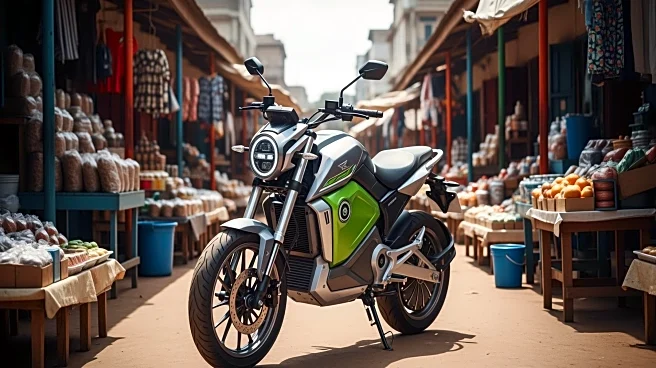What's Happening?
Electric motorcycles have gained significant traction in Kenya, capturing 10% of the new motorcycle sales market in the first eight months of 2025. This marks a notable increase from previous years, driven
by favorable financing options and stabilizing fuel prices. The Electric Mobility Association of Kenya (EMAK) reported that 9,368 electric motorcycles were sold from January to August 2025, showcasing a growing acceptance among motorcycle taxi operators. Companies like Spiro have contributed to this growth, selling 5,390 electric motorcycles during this period. The market's recovery is also supported by a strengthened Kenyan shilling and reduced fuel costs, which have improved consumer purchasing power.
Why It's Important?
The rise in electric motorcycle sales in Kenya is significant for several reasons. It represents a shift towards sustainable transportation, reducing reliance on fossil fuels and lowering CO2 emissions. This transition is crucial for Kenya, where the transport sector is a major contributor to emissions. Additionally, the increased adoption of electric motorcycles can help address energy curtailment issues by utilizing overnight charging, thus optimizing geothermal energy use. Economically, reducing fossil fuel imports, which currently cost Kenya around $500 million monthly, could alleviate the trade deficit and promote local renewable energy use.
What's Next?
The electric motorcycle market in Kenya is expected to continue its growth trajectory, potentially reaching a 15% market share by the end of 2025. This expansion is likely to be supported by increased production and sales efforts from companies within the sector. As the market evolves, stakeholders may focus on enhancing infrastructure for electric vehicle charging and further reducing costs to encourage wider adoption. The government and industry players might also explore policies and incentives to support this transition, aiming to bolster the local economy and environmental sustainability.
Beyond the Headlines
The shift towards electric motorcycles in Kenya could have broader implications for the country's energy and environmental policies. As the sector grows, it may drive innovation in renewable energy utilization and foster partnerships between local startups and international investors. This development could also influence cultural perceptions of electric vehicles, positioning them as viable alternatives to traditional combustion engines. Long-term, the success of electric motorcycles might inspire similar transitions in other sectors, contributing to a more sustainable and resilient economy.










